Health
UK study focuses on improving jockeys' mental health after injury
Jockeys are some of the most passionate, fearless people in the horse racing industry, but like any sport, injuries can happen. Most athlete populations have little trouble finding literature on how emotion management, coping strategies and moral support impacts athletes after an injury. When it comes to the horse racing industry, research on the psychological […]


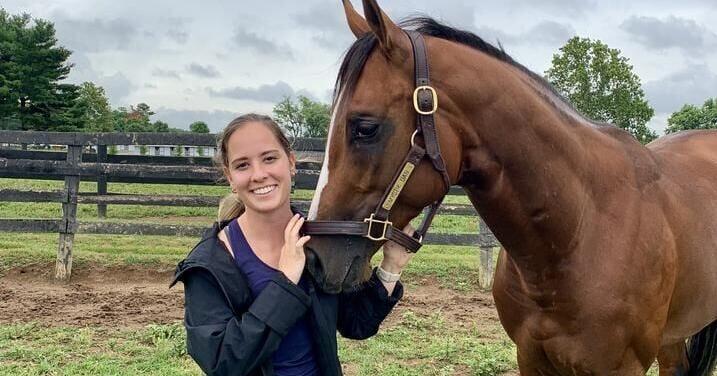
Jockeys are some of the most passionate, fearless people in the horse racing industry, but like any sport, injuries can happen.
Most athlete populations have little trouble finding literature on how emotion management, coping strategies and moral support impacts athletes after an injury. When it comes to the horse racing industry, research on the psychological effects of injuries on jockeys is lacking
Kelley Renner is a graduate student at the University of Kentucky completing her master’s degree in sport and exercise psychology in the College of Education. Through her interest in working with jockeys and the horse racing industry, Renner began exploring the effects of injury on this group of athletes.
This spring, she presented her master’s thesis, “The Psychological Impacts in Exercise Riders and Professional Jockeys Following Injury.”
“I’ve always had an interest in post-injury experience and a passion for the equine industry, so I decided to combine the two,” Renner said. “One of my core values is compassion, and if I can help people with something, even if it’s just 1%, I want to try to do that. Not a lot of horse racing spectators know the ins and outs behind the scenes of what really goes on. So, I wanted to bring awareness to this group of athletes.”
The goal of her thesis is to begin unpacking this area that is underrepresented in research, specifically looking at the psychological effects jockeys face after an injury.
Renner conducted semistructured interviews with jockeys to gather information on specific emotions associated with post injury, coping strategies they use when facing an injury, what kind of support system they have and what they go through during the return to ride process.
From her analysis she created a model that outlines the athlete’s journey when it comes to the mental impact. In traditional athletes, post-injury, there is a timeline of when the injury occurs, to the recovery period and being cleared to return to the sport. She used this timeline as a guide for her model.
“Based off the themes in the traditional athlete injury timeline, that’s where I aligned the emotions that were specifically involved with each stage of injury occurrence,” Renner said. “So, for each phase of the timeline I explored the emotions the jockeys felt. For example, during the recovery phase, how might the emotions look different for jockeys compared to traditional athletes.”
Some of the most common injuries jockeys face are concussions, muscle tears or strains, shoulder dislocation and broken bones.
“What we know is a lot of them will try to hide their injuries,” said Michaela Keener, Ph.D., an assistant professor in the Sports Medicine Research Institute, Equestrian Athlete Initiative faculty in the UK College of Health Sciences and committee member for Renner’s thesis. “There’s a lot of pressure for them to return to riding, even if they are not feeling 100%. Racing is their livelihood to support themselves and often their families. They have a lot of pressure to get back on the horse a little too early.”
In general, the horse racing business can be very strict and demanding. It’s a competitive industry, it can cause a lot of stress and fear among the riders that they can be replaced at any moment.
“I’m feeling very mad, mad because they don’t care. They replace you very soon. You have an accident, and the next day another person is going to be over there. Nobody called. Nobody’s asking how you’re feeling,” said one of the jockeys who participated in the interview.
Renner’s analysis explains that a lot of these athletes come from outside of the United States, so most of the time they don’t have a support system nearby to lean on. The jockeys told her this is something they struggle with.
The athletes have a lot of powerful emotions, but with the lack of support feel like they have no one to talk to about it.
During her interviews, Renner asked the jockeys how they coped when an injury occurred, and sadly, suicidal thoughts were mentioned.
“I had one participant admit to attempting suicide once, so it’s important for people to grasp the severity of the situation here,” Renner said. “This is why we must research, advocate for the jockeys and provide resources.”
Although suicide is at the very extreme, it happens in the horse racing world more than people would think.
“Sometimes people who go to Keeneland and watch the pretty racehorses run just don’t know what’s happening behind the scenes,” said Ashley Samson, Ph.D., a professor in the Department of Kinesiology and Health Promotion in the College of Education and chair for Renner’s thesis. “We aren’t trying to paint a horrible picture, but it’s not always pretty, and that’s the reality.”
Uniquely, Renner found that this group didn’t necessarily have a fear of reinjury, but instead, they mentioned being afraid that they might develop an anxiety around riding or racing.
“It’s the fear of having fear,” Renner said. “They know that if they are fearful, they cannot speak up about it, they feel like they must hide it. People are always told if you’re afraid to get on the horse, you should not get on that horse. But these athletes have a lot of pressure, so they feel like they have to regardless of if they have that gut feeling.”
They feel as though they don’t have a choice and must get on the horse to make their livelihood. The jockeys explained in their interviews that they don’t have anyone to talk to when they feel these emotions.
The culture of horse racing has a stigma around expressing feelings of mental health struggles. There is an unspoken rule that they shouldn’t talk about it, push it down and get back up on the horse.
Renner hopes that with her research, she can help with breaking the stigma and ensuring jockeys and other members of the industry have all the resources they need when it comes to taking care of their mental health.
“It’s a very difficult sport,” said another jockey who participated in the interview. “Mentally, this sport can drain you because you could be on top of the sky today, and tomorrow you’re only as good as your last race.”
Renner asked if any of the jockeys had experience in receiving help for their mental health or mental performance. Three out of four said no, they never have, but they all agreed that it would’ve been helpful if they would’ve had someone to talk to.
“The emphasis there is that we know that they want the help,” Renner said. “They are ready for it. It’s just the challenge of how we combat the stigma, the barriers and getting over that.”
Her data only focuses on four jockeys so far, but she feels confident that if she is able to gather more research from larger groups of jockeys, she can help them even more.
“With this research, Kelley is on the brink of something that can change the industry,” Keener said. “The Horseracing Integrity Safety Authority has recently worked with the Jockeys’ Guild to provide jockeys with 24-hour access to mental health services. As we see these resources become more available hopefully, more people will also be willing to talk to Kelley about their experiences.”
As more resources are offered to the athletes, their hopes are to begin to see a shift in the stigma around jockey mental health.
“The public needs to be more aware of these athletes, they’re often overlooked,” Renner said. “We can’t forget that these riders are human, it is a real person riding the horse. They all have a passion for riding, it’s what they love to do.”
Renner will continue to research and advocate for these athletes as she completes her master’s degree and will remain at UK to pursue her doctorate degree.
Health
Naomi Osaka tired of way media portrays her
Coming off her third-round defeat at Wimbledon, Naomi Osaka didn’t have a lot of good things to say about her performance. The four-time grand slam champion often bears her emotions for all to see and today was no different after going down July 4 to Anastasia Pavlyuchenkova 3-6 6-4 6-4. “I’m just going to be […]

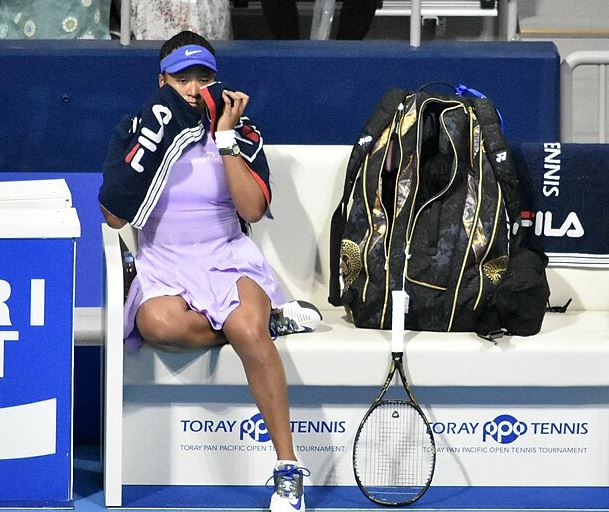

Coming off her third-round defeat at Wimbledon, Naomi Osaka didn’t have a lot of good things to say about her performance.
The four-time grand slam champion often bears her emotions for all to see and today was no different after going down July 4 to Anastasia Pavlyuchenkova 3-6 6-4 6-4.
“I’m just going to be a negative human being today. I’m so sorry. I have nothing positive to say about myself, which is something I’m working on,” she said according to the BBC.
Naomi said she’s trying to work on her outlook but admits it’s a struggle. She hasn’t gotten past the third round of a major tournament since winning the Australian Open in 2021.
However, Osaka cautioned against portraying her as always sad as she accused the media of doing.
“Bro why is it every time I do a press conference after a loss the ESPNs and blogs gotta clip it and put it up. Wtf, why don’t they clip my press conferences after I win? Like why push the narrative that I’m always sad?
“Sure I was disappointed a couple hours ago, now I’m motivated to do better. That’s human emotions. The way they clip me I feel like I should be fake happy all the time,” she said, reported Tennis Infinity.
Sports Illustrated pointed out she isn’t the only tennis player to express negative thoughts after a loss. Coco Gauf, was hard on herself after being bounced from the first round at Wimbledon, Jack Draper nearly came to tears and Alexander Zverev said he felt alone and struggles mentally following his first-round loss.
Osaka hopes to regroup as she heads into the North American leg of the hard court season.
We did it! Thank you for all those who contributed to our June fundraising campaign. We doubled the amount of money raised during the previous year. This money will be used to fund our reporting efforts.
We are published by the non-profit Asian American Media Inc and supported by our readers along with the Robert Wood Johnson Foundation, AARP, Report for America/GroundTruth Project & Koo and Patricia Yuen of the Yuen Foundation.
Find additional content on Bluesky, Facebook, Instagram ,Tiktok, X, and YouTube. Please consider interning, joining our staff, or submitting a story, or making a tax-deductible donation.
You can make your tax-deductible donations here via credit card, debit card, Apple Pay, Google Pay, PayPal and Venmo. Stock donations and donations via DAFs are also welcomed. Contact us at info @ asamnews dot com for more info.
Related
Health
Integrating Acceptance and Commitment Therapy (ACT) with Psychological Skills Training (PST)
ORIGINAL RESEARCH article Front. Psychol. Sec. Sport Psychology Volume 16 – 2025 | doi: 10.3389/fpsyg.2025.1617548 This article is part of the Research TopicMental Health in Recreational and Elite SportsView all 22 articles Provisionally accepted Manchester Metropolitan University, Manchester, United Kingdom The final, formatted version of the article will be published soon. Notify me You have […]
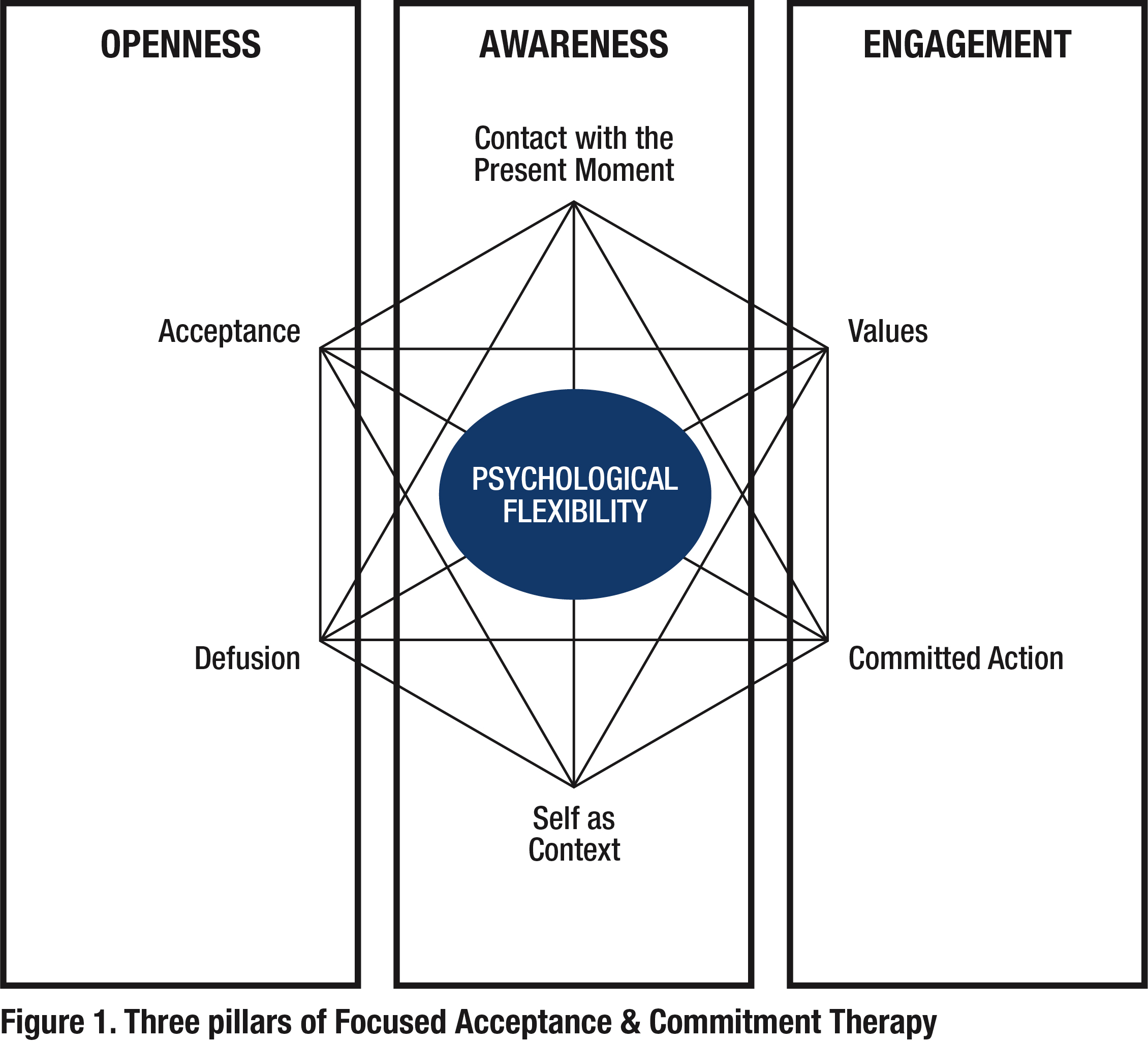
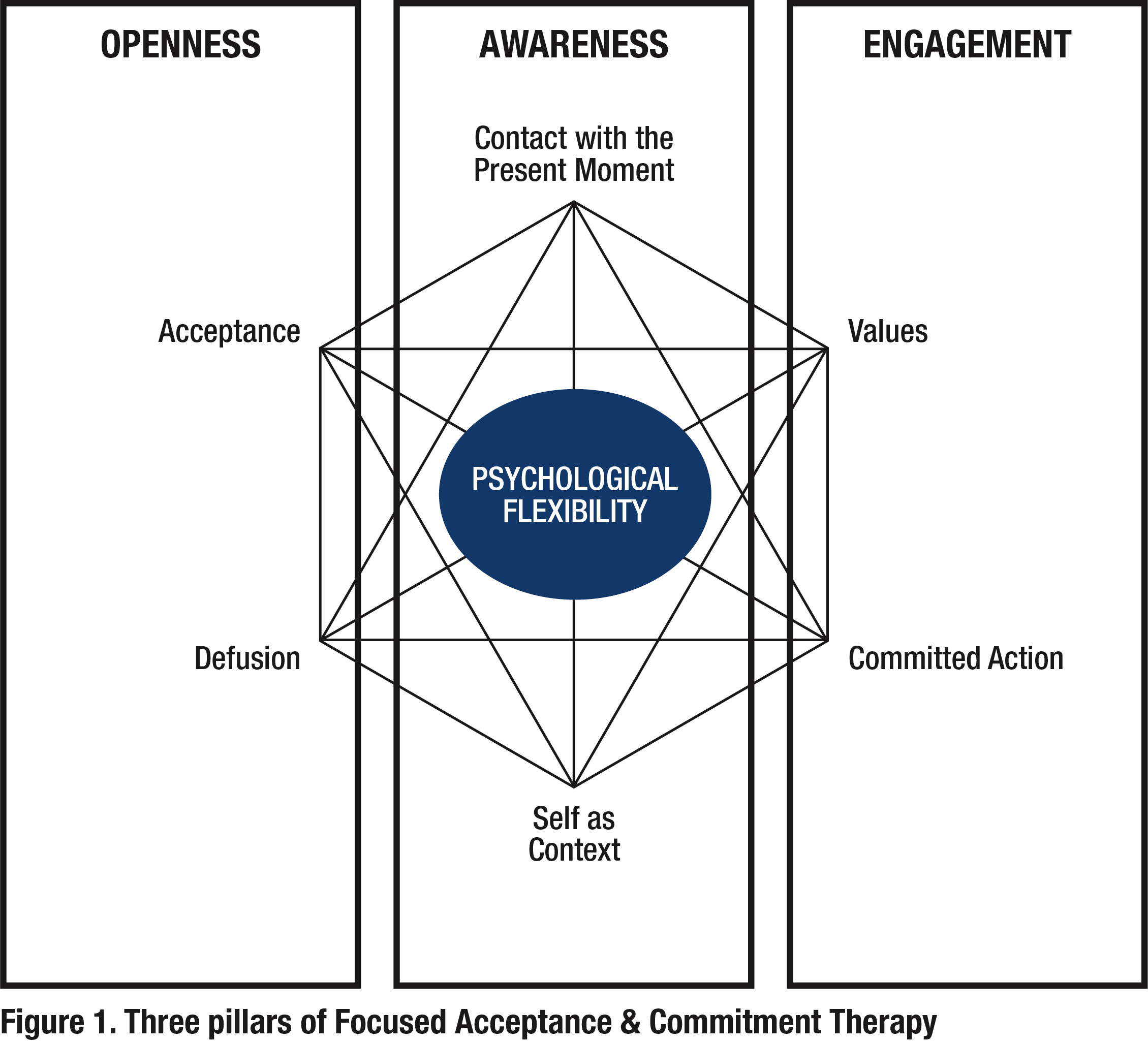

ORIGINAL RESEARCH article
Front. Psychol.
Sec. Sport Psychology
Volume 16 – 2025 | doi: 10.3389/fpsyg.2025.1617548
This article is part of the Research TopicMental Health in Recreational and Elite SportsView all 22 articles
Provisionally accepted
- Manchester Metropolitan University, Manchester, United Kingdom
You have multiple emails registered with Frontiers:
Please enter your email address:
If you already have an account, please login
You don’t have a Frontiers account ? You can register here
This case study outlines the sport psychology service delivery provided to an 11-year-old competitive figure skater. The client reported performance anxiety, which hindered her training and performance at competition. The intervention delivered integrated core processes of Acceptance and Commitment Therapy (ACT) with psychological skills training (PST) with the aim of reducing the client’s performance anxiety. Little has been written about how ACT can be applied alongside PST. The case reports how ACT exercises aimed at defusing the client’s unhelpful cognitions, focusing on valued living, committed action, and staying in the present moment were integrated into goal setting, imagery, performance profiling, and self-talk. Demonstrating the alignment between ACT and PST is crucial for practitioners to seamlessly integrate ACT into their practice. Reflections from the client and practitioner capture the evaluation of the service delivery.
Keywords: cbt, MST, performance, sport psychology, Psychotherapy, Youth
Received: 24 Apr 2025; Accepted: 04 Jul 2025.
Copyright: © 2025 Wood and Turner. This is an open-access article distributed under the terms of the Creative Commons Attribution License (CC BY). The use, distribution or reproduction in other forums is permitted, provided the original author(s) or licensor are credited and that the original publication in this journal is cited, in accordance with accepted academic practice. No use, distribution or reproduction is permitted which does not comply with these terms.
* Correspondence: Samuel Wood, Manchester Metropolitan University, Manchester, United Kingdom
Disclaimer: All claims expressed in this article are solely those of the authors and do not necessarily represent those of their affiliated organizations, or those of the publisher, the editors and the reviewers. Any product that may be evaluated in this article or claim that may be made by its manufacturer is not guaranteed or endorsed by the publisher.
Health
Gambling investigation of Guardians' Luis Ortiz the latest example of how betting is causing …
CLEVELAND, Ohio — Guardians pitcher Luis Ortiz was placed on “non-disciplinary paid leave” on Thursday morning by Major League Baseball as it investigates gambling allegations. And while Ortiz’s case is still under investigation, it is the latest instance of what has become a worrying and increasing trend of pro sports athletes being investigated for gambling. […]


CLEVELAND, Ohio — Guardians pitcher Luis Ortiz was placed on “non-disciplinary paid leave” on Thursday morning by Major League Baseball as it investigates gambling allegations.
And while Ortiz’s case is still under investigation, it is the latest instance of what has become a worrying and increasing trend of pro sports athletes being investigated for gambling.
Sports gambling has become much more part of the mainstream after the Supreme Court in 2018 struck down a federal law prohibiting sports gambling, putting it into the hands of the states.
Most leagues don’t allow players to bet on games in their own leagues, and it’s easy to understand why.
Leagues don’t want the integrity of their games compromised by their athletes betting on their own games, even ones they don’t play in. Players can have inside information that could influence betting lines.
If an athlete bets on games he’s involved in, it could harm integrity more if he tries to influence certain outcomes or stats within the game.
One of the most specific elements of sports betting that comes under this scrutiny is prop betting. A prop bet is simply a bet placed on an outcome within a game such as a certain number of points a basketball player scores or whether a baseball player gets one or more hits in a game.
Possibly the most significant example of a pro athlete being connected to prop betting was former Toronto Raptors forward Jontay Porter. He was banned from the NBA in 2024 for breaking numerous league rules about gambling.
Not only did he himself bet on at least 13 games when he was either with the Raptors or their developmental league affiliate, but he was also found to have intentionally taken himself out of at least one game to influence a betting outcome.
The NBA also found that Porter provided confidential health information about himself prior to a game on March 20, 2024. The league then found a bet of $80,000 placed on Porter to underperform in that game. He played just three minutes in that game. But the bet was frozen because of the unusual activity.
In the case of Ortiz, ESPN’s Jeff Passan reported on Thursday that there were two particular pitches that flagged bets in three states including Ohio. First pitches can be bet on, which are called microbets.
Gambling and betting in pro sports hasn’t been limited to the last seven years. The two most significant instances of pro athletes being busted for illegal gambling activities came from MLB when the 1919 Chicago White Sox threw the World Series and Reds great Pete Rose was confirmed to have bet on games he played in. The MLB issued lifetime bans to eight members of the 1919 White Sox, including Shoeless Joe Jackson, and to Rose in 1989, although both Rose and Jackson were among those reinstated in May of 2025.
With gambling being more mainstream, there have been plenty of instances in the past few years of athletes being investigated and disciplined.
NBA
In addition to being banned for life from the NBA, Porter pled guilty to conspiracy to commit wire fraud in federal court in July 2024 and awaits sentencing, which has been pushed back until Dec. 10.
Porter’s case is the most egregious in recent years. But he’s not the only NBA player who has had gambling accusations.
Pistons guard Malik Beasley is currently under federal investigation on allegations related to betting on NBA games and prop bets.
NFL
NFL receiver Calvin Ridley was suspended for the 2022 season for betting on games when he was on mental health leave the year prior.
In 2023, five NFL players including Lions wide receiver Jameson Williams were suspended for violating the league’s gambling protocols. Three received indefinite bans for betting on NFL games while two, including Williams, were suspended for six for mobile betting at the Lions’ team facility, which violates league rules.
NHL
In the NHL, Ottawa Senators center Shane Pinto received a 41-game suspension in 2023 for gambling violations, although the NHL did not find evidence of Pinto betting on NHL games.
MLB
On June 4, 2024, MLB issued a lifetime ban, the first since Rose in 1989, to former Pirates and Padres infielder Tucupita Marcano after he was determined to have placed nearly 400 baseball bets in a two-year span, including 25 on Pirates games in which he was on the roster. He was the first active player to receive a lifetime ban from MLB since Jimmy O’Connell in 1924.
So while Ortiz’s saga is only in its beginning stages, he is the latest example of athletes in professional sports being investigated for betting while playing. However, trends suggest he might not be the last.
In February 2025, the International Betting Integrity Association, which is a non-profit organization with a goal to protect betting integrity, released a report saying that it had received 219 alerts of suspicious betting, an increase of 17% from the year prior. 10 of those alerts came from the U.S., with five involving basketball and five for tennis.
Some states have tried to limit this trend by going after prop betting, particularly outside the pro game.
In 2024, the Ohio Casino Control Commission banned prop bets on college athletics in the state. Many other states including Arizona, Florida, Louisiana and Massachusetts also don’t allow prop bets for in-state college athletics.
Other states like Illinois, New York and Virginia have gone a step further and won’t allow any bets involving in-state schools.
NCAA president Charlie Baker spoke at a Senate Judiciary Committee hearing in December 2024 and said he wants prop bets banned in all college sports across the country.
“We believe that when bettors can’t gamble on college athletes’ individual performances, they’re far less likely to attempt to scrutinize, coerce or harass student-athletes,” Baker told the committee per NPR’s Becky Sullivan. “They get demands for money from unhappy bettors for trivial things that don’t impact the result on the field.
“Many have received death threats from bettors, and they also receive other, in-person threats and accusations directed at them while they’re leaving or coming onto the field of play.”
With the growth of sports betting, the problem of pro athletes being investigated for gambling is not likely to go away. Ortiz wasn’t the first athlete to be investigated for gambling and he most likely won’t be the last.
If you purchase a product or register for an account through a link on our site, we may receive compensation. By using this site, you consent to our User Agreement and agree that your clicks, interactions, and personal information may be collected, recorded, and/or stored by us and social media and other third-party partners in accordance with our Privacy Policy.
Health
Keeping Baseball Players' Minds In Shape; Battle Over Bacon
Summer is the heart of the baseball season. But recently the country’s oldest professional sport has been going through some changes. It’s not just the moves to speed up the pace of play. These days, along with training in the weight room or the bullpen, players are also spending time with their team’s sports psychologist. […]



Summer is the heart of the baseball season. But recently the country’s oldest professional sport has been going through some changes. It’s not just the moves to speed up the pace of play. These days, along with training in the weight room or the bullpen, players are also spending time with their team’s sports psychologist. KQED’s health correspondent April Dembosky goes behind the scenes at the San Francisco Giants’ ballpark to understand how the team keeps an athlete’s mind in shape, both on and off the field.
Health
How volleyball helped UC Irvine's Ofure Iselen step into her confidence
Story Links (This story was originally published on ucirvinesports.com) Journeys. Whether it be starting school or a new hobby, everyone in life goes through them – and the ups and downs that come along the way. The thing about journeys is they feel long while they’re happening but when you look back, it really went by […]
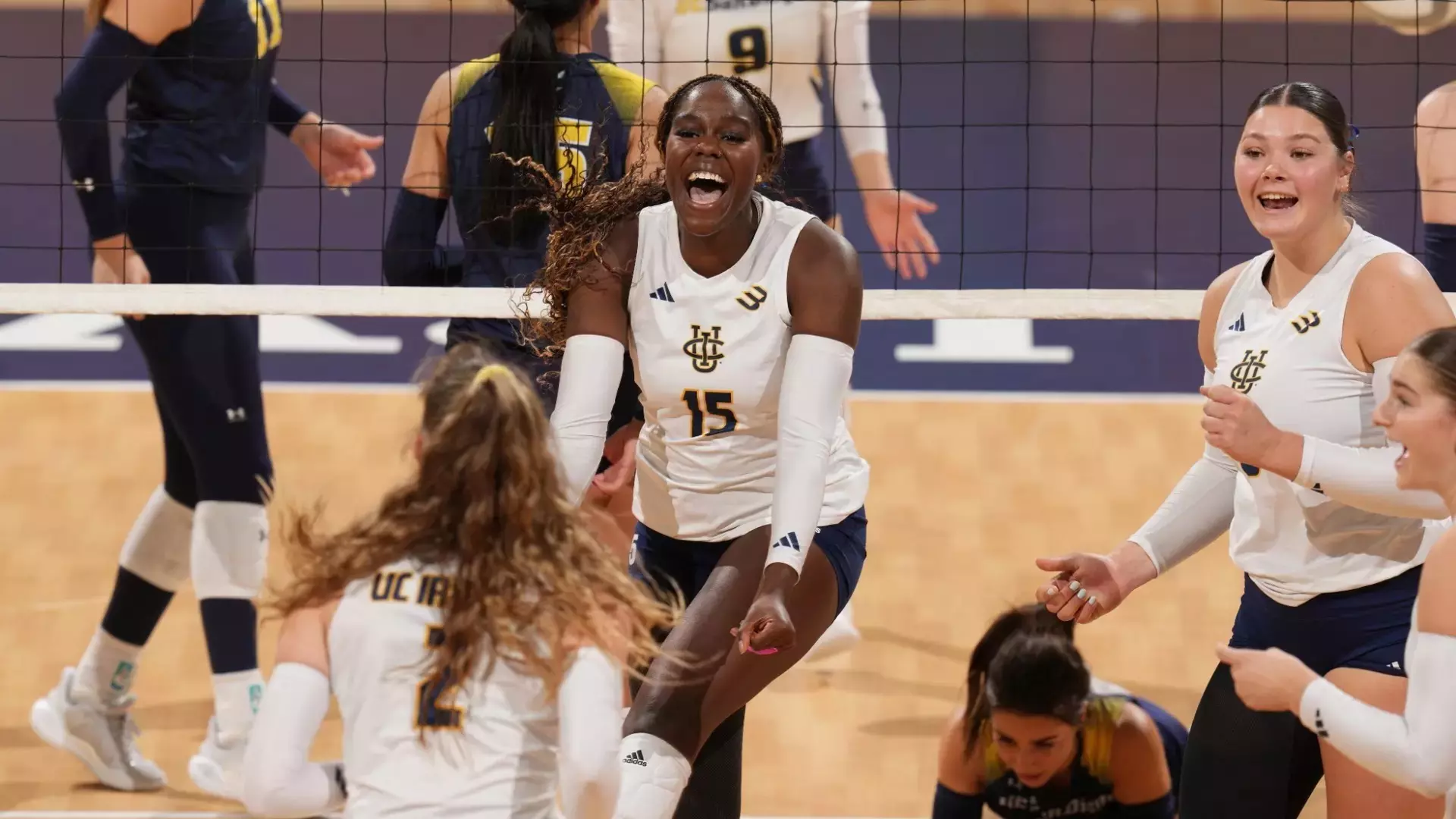

(This story was originally published on ucirvinesports.com)
Journeys. Whether it be starting school or a new hobby, everyone in life goes through them – and the ups and downs that come along the way.
The thing about journeys is they feel long while they’re happening but when you look back, it really went by in a flash. Only when you take a step back and look at your journey can you see the highs and lows and realize how it was all worth it. This is how senior Ofure Iselen would describe her time at UC Irvine as a member of the women’s volleyball team: a journey.
“I would describe it as a journey. I know it’s cliche, but it flew by so fast. I can’t even wrap my head around that it’s done. I would just describe it as a roller coaster. There were the highest of highs and there were the lowest of the lows.”
Iselen’s volleyball career had an unexpected starting point. As her mom wanted her and her siblings to stay active, she was involved with multiple sports growing up. However, it was actually her friend who convinced her to try out for a volleyball team.
“Once I got to middle school, I made my friend try out for the basketball team and then she made me try out for the volleyball team. So, I was just playing middle school volleyball, nothing serious. Then once I got to high school, my mom was like, okay, you have to pick one to really get serious about.”
Since the volleyball season started in the fall before basketball, Iselen’s high school athletic career began with spikes instead of layups, and the rest is history. She made varsity her freshman year and enjoyed the experience. She had found her sport of choice.
Having only started playing competitive volleyball her freshman year of high school, Iselen had some catching up to do, but that didn’t stop others from recognizing her potential. During her high school season, a club director approached her and asked about joining their club volleyball team. Iselen was immediately interested as it would help her grow and they saw potential in her ability to play at the collegiate level.
Iselen put in the work and eventually schools started calling. When it came time to commit, UC Irvine felt like the right fit.
“I had heard of UC Irvine. Some of my friends’ older siblings went there so I was familiar with the school. It was really pretty, and it was not too far from home (the Bay Area). Also, UCI is a really well-known school and that degree holds a lot of weight, so I felt I was getting the best of both worlds. I would get to live out my dreams of playing Division I volleyball while also getting a degree that could push me further after I’m done with volleyball.”
Her freshman season was all about learning and adjusting to the college life. At the advice of her coaches, and coming off an early injury, she focused her efforts in the weight room and learning the ins-and-outs of being a Division I student-athlete.
“My freshman year, I didn’t have many expectations. Coach Ashlie (Hain) told me when I first came in to get serious in that weight room because it would help me a ton. I took that to heart, and I made sure that the weight room was my best friend. Being in the weight room seriously and trying to find that [improvement], and then senior year breaking into that starting lineup was huge for me. It felt like my whole journey kind of meant something and all my hard work didn’t go to waste. I was happy the way we ended, and I couldn’t have asked for a better senior season.”

Iselen bided her time and put in the work to continually improve. She played sparingly her first two seasons with her playing time increasing her junior year, but it wasn’t until her senior season when she earned the opportunity to be in the starting lineup. That doesn’t mean there weren’t still a few bumps along the way in her journey. While she began the season in the starting lineup, by the end of the second preseason tournament, Iselen found herself back on the bench. It was a mental battle as this was her senior year and there was no next season.
“It was probably the biggest challenge mentally and emotionally that I had to face because before it was always like you have next year to try again or get better, but getting benched during preseason of my senior year, I was like there is no next year, right? It was more of a mental challenge than it was a physical challenge because I felt like I was there physically, but mentally I couldn’t perform. I’ve never had to deal with my mental health throughout sports. I was always a pretty positive person. So, when my mental wasn’t there, it’s like, how do you get back to believing in yourself? How do you get back to who you are as a person and as a player?”
Still, Iselen persevered and found her way back into the lineup during the beginning of conference play. From there, she continued to play well, helping lead the Anteaters to a winning record, the program’s first season sweep of Hawai’i and an appearance in the Big West Championships. She ended her senior season ranked first in the Big West in blocks per set (1.24), while averaging 1.21 kills per set and making the Big West Fall All-Academic team.
Iselen looks back on her career fondly and will always cherish the people she met and memories she made with UCI volleyball.
“I’ve met so many amazing people at UCI that I know I’m going to have in my life forever. I never understood when people said that when they come to college, they find their forever people, but I truly did. I’m so appreciative for this school. When I was a kid out of high school, Coach Ashlie took a chance on me because I had only been playing for a few years and I’m so grateful that I was given the opportunity to showcase who I am, not just as an athlete, but as a person too.”
Off the court, Iselen spent a large amount of time with the Student-Athlete Advisory Committee (SAAC) and helped found the Black Student Athlete Alliance (BSAA) at UCI. With her involvement in these organizations and her experience as a student-athlete, a new position opened up that allowed Iselen to remain with UCI Athletics.
After graduating earlier this year with a degree in Political Science (she will walk this weekend), Iselen has served as the Student Athlete Development Coordinator the past two quarters. Her experience and relationships she built at UCI has helped her understand the needs of student-athletes and to plan events and workshops that cater to their interests.
“I work a lot with career development. Having former collegiate athletes come back, from all different sports and schools, and just kind of talk to our student athletes about life after sport and helping them with that transition.
“I feel like I have a unique experience because I’m still in it. A lot of my friends are still student-athletes. I just take their feedback of the things that they feel we’re lacking, and I have the ability to bring those things to life.”
After graduation, Iselen plans to take a gap year and then pursue her MBA. Her plan to become a marketing executive hasn’t changed.
“Coming back from the Black Student Athlete Summit (in 2023), and talking to different marketing executives there made me realize that is what I want to do, so I’ve just been growing in that area too.”
Iselen’s time at UCI wasn’t necessarily a typical one, coming in after COVID, getting a late start in the sport to becoming a key starter as a senior, to continuing to assist student-athletes after her athletic career ended, she always sees the growth in her opportunities and her work. While her journey at UC Irvine has come to a close, her next journey is just getting started. Iselen has no regrets and will forever cherish being an Anteater.
“Just going through this journey – this was such a unique experience that I was gracious to have. Going on the journey alongside people you build a bond with can’t be replaced, they’ve seen you when you were at your lowest and they were the ones that picked you up and carried you through. This is something that you definitely can’t do alone. Finding that community and finding those people who I was able to lean on when I needed to, and then, when it was their turn, for me to be there for them. You create that bond that just lasts for a long time, and I feel like that’s the thing that I probably take away the most is those relationships. I’ve definitely grown and changed a lot since my freshman year. Looking back and seeing videos of myself from four years ago, I’m like, wow, this person has come a long way.”

Health
Natasha Hastings and Michelle Carter inducted into NYAC Hall of Fame
Not possible without you! Our journalism is only possible with support from you, our readers. The news mainstream media just doesn’t cover. Racial justice journalism since 1909. Sign up for our FREE acclaimed newsletters! The news mainstream media just doesn’t cover. Racial justice journalism since 1909. Protect our Racial Justice Journalism — Subscribe Now! We […]

It was an auspicious evening on June 25 when athletes whose names are etched in history gathered at the New York Athletic Club (NYAC) to celebrate their induction into the NYAC Hall of Fame. The nine athletes honored that evening all had extensive career accomplishments, including national championships, world championships and Olympic medals.
Among the honorees were close friends and teammates, shot putter Michelle Carter and sprinter Natasha Hastings.
“Michelle and I obviously had our separate journeys, but throughout the latter part of our careers we were Frick and Frack,” said Hastings, who won Olympic gold medals in 2008 and ’16 as a member of the 4×400 relay. “It’s funny when you think about how we made a junior team together in 2003 or ’04, and then we made several national teams together and then 2016 Games, of course. It was really nice being inducted with her.
They both trained in Texas (Hastings in Austin and Carter in Dallas) but it was understood if they were going to the same track meet they would be roommates. They’d eat their meals together and explore the cities together.
“The thing that was really special about our friendship throughout the years was that we held each other accountable,” said Hastings. “Those are the things that make real friends. Genuinely wanting the best for each other.”


Hastings was born in Brooklyn, grew up in Queens and attended high school in Harlem, so even though she hasn’t lived in New York City since she was 18, being associated with the NYAC as a competitive athlete made her feel like she was representing her hometown. She is deeply appreciative of the support the club provided as she pursued her Olympic dreams. Now a lifetime member, she intends to pay it forward.
“I look forward to being involved and helping with the future athletes and the athletes of now,” she said.
Speaking with the New York Amsterdam News several days after the NYAC Hall of Fame banquet, she was still feeling the joy. It was deeply meaningful that her son, mother, brother and extended family and friends were in attendance to cheer her on.
Today, Hastings works at her alma mater, University of South Carolina, where she is now a licensed professional counselor associate. She works with the university’s mental health and performance team, providing mental health services to student-athletes and teams.
“I see students for anxiety management, life transitions. A lot of students, their first year away from home is hard, or they’re transferring and going through the transition, and they just need someone to talk to,” Hastings said. “We also do some performance work where they feel like they’re having mental blocks or they’re suffering from performance anxiety.”
Her personal mission is to provide representation of Black women in the therapeutic space. “I want BIPOC, marginalized communities to see that we’re in the space,” Hastings said. “Someone who has the lived experiences in the shoes that they walk.”
Carter won Olympic gold at the 2016 Olympics in Rio, the first and still only American woman to do so in the shot put. Today, she is a motivational speaker, who shares stories of overcoming challenges.
“As a young girl throwing a heavy metal ball, I never imagined one day looking at a room like this,” Carter said at the banquet. “To now be a part of NYAC’s incredible legacy, an institution that has long standing excellence, is both humbling and powerful.”
As a self-described girlie girl with a strong arm and a stronger lip gloss game, Carter expressed appreciation that the NYAC let her be her best authentic self. She said that you don’t just break records, you break barriers. Hastings noted that she and Carter would often share notes on cosmetics, and they appreciate that today’s track and field athletes feel more comfortable going with or without glam as it suits them.
“When I became the first American woman to win Olympic gold in shot put, I did it as me — lashes on, lips were popping and confidence turned all the way up,” Carter said. “You don’t have to change who you are to be successful; you just have to trust what God gave you to be. … I am able to share my story to help others see that [a] champion mindset isn’t just for sports — it’s for life, it’s for business, for school and for self-care. Showing up every day as your full, powerful self.”
The other 2025 inductees are Katie Meili (swimming), Curt Clausen (track and field), Katie Zaferes (triathlon), Kami Craig (water polo), Melissa Seidemann (water polo), John Mann (water polo) and Jesse Smith (water polo).
-

 Motorsports3 weeks ago
Motorsports3 weeks agoNASCAR Race Today: Mexico City start times, schedule and how to watch live on TV
-

 Motorsports3 weeks ago
Motorsports3 weeks agoNASCAR in Mexico City: Where to watch, start time, stream, lineup, race preview for inaugural Viva Mexico 250
-

 College Sports1 week ago
College Sports1 week agoWAC to Rebrand to UAC, Add Five New Members in 2026
-

 Health3 weeks ago
Health3 weeks agoKyrie Irving's Strong Message Amid Men's Mental Health Awareness Month
-

 College Sports3 weeks ago
College Sports3 weeks agoLivvy Dunne honors boyfriend Paul Skenes with twist on LSU jersey
-

 Technology3 weeks ago
Technology3 weeks agoPolar is teasing a Whoop alternative without subscription
-
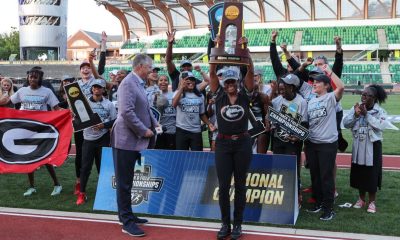
 Sports3 weeks ago
Sports3 weeks agoGeorgia women soar to first outdoor track championship
-

 Motorsports3 weeks ago
Motorsports3 weeks agoParker Kligerman Mourns Loss of NASCAR Team Owner in Moving Tribute
-

 Motorsports5 days ago
Motorsports5 days agoWhy Cosmetics are Making Up for Lost Time in Women’s Sports
-

 College Sports3 weeks ago
College Sports3 weeks agoFisk University women’s gymnastics team, the first at an HBCU, to stop competing after 2026 | National Sports












 #NBAFinals
#NBAFinals

























